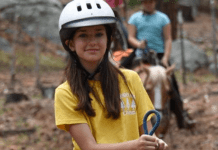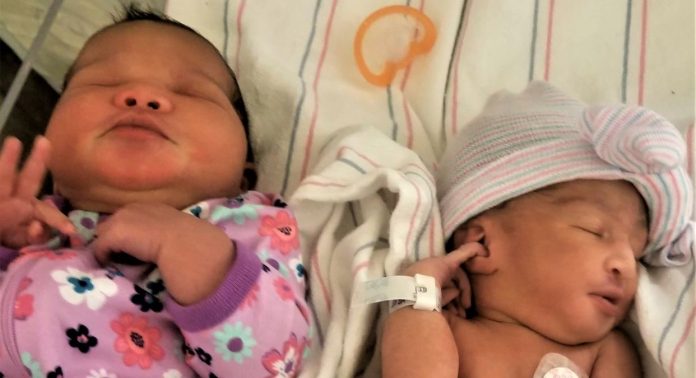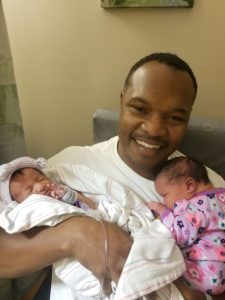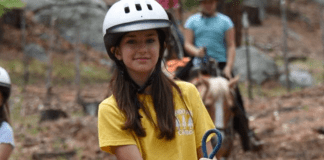September is Neonatal Intensive Care Unit Awareness Month.
T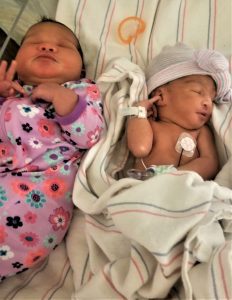 he Neonatal Intensive Care Unit (NICU) is a special place. It’s a place with many happy moments for some and many sad moments for others. This place is filled with amazing nurses who spend countless hours caring for our vulnerable babies. Babies who need a little support and babies who need a lot more. Some babies stay for a day. Some babies have stayed for over 100 days.
he Neonatal Intensive Care Unit (NICU) is a special place. It’s a place with many happy moments for some and many sad moments for others. This place is filled with amazing nurses who spend countless hours caring for our vulnerable babies. Babies who need a little support and babies who need a lot more. Some babies stay for a day. Some babies have stayed for over 100 days.
When I had my twins, I expected a NICU stay. I didn’t know how long or to what extent. It was a discussion I had with my providers during my entire pregnancy. Pregnancy can be unpredictable. I was told that twin pregnancies can be just as unpredictable. We can’t really predict when a woman will spontaneously go into labor. This is the same for twin pregnancies. I told my twins they better hang in there until their eviction date. Probably the first and only time they listened to me.
I didn’t know what to expect when I went into that hospital on November 19, 2018. We knew Kali was measuring smaller than Kori, but not by 3 lbs. Kali spent a week in the NICU. She needed support with feeding, temperature and blood sugar regulation. She would spend the first five months of her life struggling to eat. She started thriving at five months when she got her nasogastric feeding tube. That moment changed everything for us and most importantly for her. She started to grow, develop, and thrive.
When you leave the NICU, the NICU doesn’t leave you. I read many stories about moms and their NICU experiences. The beeping of the IV pumps. The smell of the hospital. The sounds of the machines. The silence. The noise. The light. The dark. They remember it all. Some moms have even expressed having PTSD, related to their NICU experience.
After seeing Kali and watching her during that week in the NICU, I knew she would be okay. I also knew I would need help. I knew she would need support. Not all moms can say the same. Some moms weren’t sure their babies would make it through the first night. Some moms were happy to take their baby home after 100+ days. Some moms had t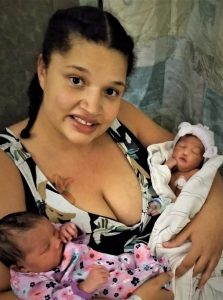 o say goodbye to their babies in the NICU. Every NICU mom has a different story.
o say goodbye to their babies in the NICU. Every NICU mom has a different story.
I didn’t know what to expect on our journey but I accepted all resources offered to me. I wasn’t sure if her feeding difficulties were temporary or permanent. All I knew was early intervention was our best chance at identifying problems, obtaining support, utilizing options while helping her develop to the best of her abilities. I enrolled her in the Arizona High Risk Perinatal Program/Newborn Intensive Care Program (HRPP/NICP) after she left the NICU. Kali also started in AzEIP, Arizona Early Intervention program, around four months.
“HRPP/NICP provides free in-home community health nursing services to assist eligible families and their newborns during the transition from the Newborn Intensive Care Unit (NICU) to their home and community.” If your baby spends more than five days in the NICU you may qualify for this program. The NICU nurse should provide information on how to register. A specially trained nurse can follow your child’s progress for up to three years. They will monitor your child’s growth and development, and provide you with community and family resources your child may need. They are also there to give you and your family support and education. This is a voluntary program with a huge benefit to you and your family if you need it.
“The Arizona Early Intervention Program is Arizona’s statewide interagency system of services and supports for families of infants and toddlers, birth to three years of age, with disabilities or delays. AzEIP is established by Part C of the Individuals with Disabilities Education Act (IDEA), which provides eligible children and their families access to services to enhance the capacity of families and caregivers to support the child’s development.” One benefit of this program is you can seek an evaluation if you have concerns about your child’s development. Your pediatrician can also send a referral if they notice developmental concerns at a well child visit. Depending on your child’s developmental needs a specialist will begin regular visits. During these visits you will have the opportunity to establish goals to monitor your child’s progress. Your developmental specialist will then provide educational techniques to help achieve those goals. This program is voluntary but very beneficial in identifying developmental delays or disabilities early.
I was able to identify Kali’s developmental needs early, while navigating through the healthcare system. My goal was to identify any known causes for her feeding difficulties and developmental delays. People would ask me why? Why am I going to specialist after specialist? Why am I searching for something that may not exist? Why not wait and see? I would respond with why not? If there was an underlying cause, I would find it. If it was related to her intrauterine growth restriction, I would eliminate all other possibilities.
Looking back these programs helped me, just as much as it helped Kali. I built relationships with her therapists. I bounced ideas off of them. I was able to share my concerns and they provided resources and tools to help me. I’d like to think I did it all by myself but in reality, I had a ton of support. My biggest advantage was my ability to navigate the healthcare system. I had an understanding which specialist handle which concern and how to obtain referrals. I sometimes wonder how much harder it would have been had I not received the knowledge and support. I wonder where Kali would be now had I not acted on my instincts, accepted assistance, listened, asked questions, and advocated for her. I want you to know that there are resources available to help you through your parenting journey. I am still researching other organizations like the ones mention in order to help as many families as I can. Ask your healthcare provider if you have concerns with developmental milestones. Early intervention is key.

